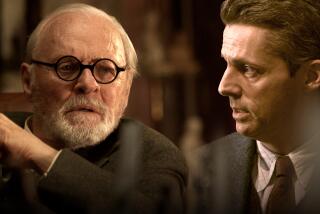Invigorating portrait of an analytical mind
- Share via
To paraphrase Raymond Chandler, French philosopher Jacques Derrida is smart the way other people think they’re smart. And the great pleasure of “Derrida,” an absolutely first-rate documentary about his life and thought that is the cinematic equivalent of a mind-expanding drug, is how invigorating and refreshing it is to be in the presence of such a powerful, agile intellect.
Now in his early 70s, Derrida is considered the father of deconstruction, a key philosophical movement that questions the assumptions both everyday language and rarefied theoretical discourse are based on. As one French interviewer put it, he is “a thinker of lightning thoughts, like those miners who work by exploding the beams supporting their shafts.”
Derrida has been ranked with Marx and Freud as an influential 20th century figure, but you don’t need a familiarity with his work to appreciate those keen insights, to feel how tonic it is to experience the workings of a piercingly analytical mind.
More than five years in the making, “Derrida” is the result of an unusual collaboration between the philosopher and two co-directors. Kirby Dick is an award-winning documentary filmmaker whose works include “Chain Camera.” Amy Ziering Kofman, on the other hand, is a former academic who became a fan of Derrida’s when she stumbled on his writings at age 16 and has known the philosopher since she studied with him as a graduate student in the 1980s.
This long-term friendship benefited the film in several ways during the time it took to shoot. At the most basic level, it gained the crew access, resulting in a number of charming “the genius at home” sequences, where we see Derrida searching for his keys, buttering his toast and deciding which jacket goes with which pair of pants.
More important, it’s clear that Kofman has Derrida’s respect, that he takes her seriously. Some of “Derrida’s” best moments reveal the man’s playful side, as he spars with the interviewer about the questions she’s asking and makes amused comments about the complete artificiality of the film’s nominally realistic structure. “Everything about cinema verite,” he says tartly, “is false.”
Derrida is often a wary subject, unwilling to give away too much about his personal life. Yet he is candid about growing up Jewish in French-ruled Algeria, and about the profound effect that being expelled from school at age 10 in a wave of anti-Semitism had on his worldview.
Sometimes the back-and-forth between Kofman and Derrida leads to compelling results. After first refusing to answer a question about his thoughts on love (“I’m incapable of generalities”), he launches into a fascinating discourse about love as the difference between who and what, about whether we love someone for the singularity of who they are or their specific qualities.
Equally at home in English and French, Derrida is a masterful speaker, whether talking about the paradox of forgiveness in South Africa, the nature of archives at UC Irvine (where there is one dedicated to him), or why he would be interested in hearing the great philosophers of the past talk about their sex lives.
With his unruly white hair and hawk-like face, Derrida is a compelling presence even when he is merely pondering a question. Even his off-the-cuff comments are intriguing, because everything gets serious consideration. And when he is wary, he’s never difficult for its own sake but because his philosophical positions make him that way.
“Derrida” benefits greatly from the ethereal, other-worldly score it commissioned from veteran composer Ryuichi Sakamoto. In a paradox the subject would probably enjoy, the only aspect of the film that is not successful is the decision to have co-director Kofman read lengthy excerpts of Derrida’s work as voice-overs. Though these selections do give a sense of the texture of the philosopher’s work, phrases like “narcissistic reappropriation” are too dense and hard to follow when a printed page can’t be referred to. Fortunately, we have the man himself to listen to, and there turn out to be few things as bracing, as purely joyous, as that.
*
‘Derrida’
MPAA rating: Unrated
Times guidelines: Nothing objectionable.
A Jane Doe films production, released by Zeitgeist Films. Directors Kirby Dick and Amy Ziering Kofman. Producer Amy Ziering Kofman. Cinematographer Kirsten Johnson. Editors Kirby Dick and Matt Clarke. Music Ryuichi Sakamoto. Running time: 1 hour, 25 minutes. Exclusively at the Nuart Theater, 11272 Santa Monica Blvd., West L.A., (310) 478-6379.
More to Read
Only good movies
Get the Indie Focus newsletter, Mark Olsen's weekly guide to the world of cinema.
You may occasionally receive promotional content from the Los Angeles Times.











